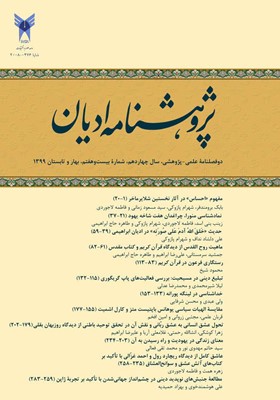مفهوم «احساس» در آثار نخستین شلایرماخر
محورهای موضوعی : مسیحیت
بابک برومندفر
1
![]() ,
شهرام پازوکی
2
,
سید مسعود زمانی
3
*
,
فاطمه لاجوردی
4
,
شهرام پازوکی
2
,
سید مسعود زمانی
3
*
,
فاطمه لاجوردی
4
![]()
1 - دانشجوی دکتری ادیان و عرفان تطبیقی، دانشکده حقوق، الهیات و علوم سیاسی، واحد علوم و تحقیقات، دانشگاه آزاد اسلامی، تهران، ایران
2 - استاد مؤسسه پژوهشی حکمت و فلسفه ایران، تهران، ایران
3 - استادیار مؤسسه پژوهشی حکمت و فلسفه ایران، تهران، ایران
4 - استادیار گروه ادیان و عرفان، دانشکده حقوق، الهیات و علوم سیاسی، واحد علوم و تحقیقات، دانشگاه آزاد اسلامی، تهران، ایران
کلید واژه: شلایرماخر, احساس, ارسطو, خیر اعلی, کانت,
چکیده مقاله :
در نظام الاهیاتی شلایرماخر، مفهوم احساس جایگاه مهمی دارد و شالودة تجربة دینی در نگاه او مبتنی بر آن است. سؤال پژوهشی مقالة حاضر، دربارة مفهوم احساس (Gefühl) از نگاه شلایرماخر با توجه به آثار او تا سال 1792 میلادی است. شلایرماخر در زمانه ای زیسته که مواجهة فیلسوفان با مسائل مابعدالطبیعه و الاهیات، نسبت به دوران باستان و قرون وسطی تفاوت های چشمگیری یافته است. هرچند موضوعات اصلی فلسفه همچون خدا، نفس و جاودانگی آن، محوریت خود را از دست نداده بودند، اما فیلسوفان از افقی دیگر به آنها مینگریستند و این سبب انقلابی در نظام های الاهیات مدرسی شد. شلایرماخر از یک سو در ردای کشیش مسیحی پا به میدان مینهد که متأثر از جریان فلسفة کانتی و اندیشه های اوست؛ از سوی دیگر او به دنبال تعریفی دوباره از دین با توجه به مفهوم احساس است تا بتواند دین را از فروکاست به اخلاق کانتی برهاند. او در رساله های نخستین خویش با تأثیرگرفتن از ارسطو و فیلسوفان یونانی و جریان فلسفة استعلایی کانت، حول مفهوم احساس می کوشد دینداری و الاهیات مسیحی را از سیطرة اندیشه های کانت و عقل گرایی دورة روشنگری نجات دهد؛ در این مقاله می کوشیم با تأکید بر آثار اولیه شلایرماخر تا سال 1792 سیر تحولات مفهوم احساس را بررسی کنیم.
In Schleiermacher’s theological system, the concept of Feeling (Gefühl) has a significant role and the foundation of Religious Experience, in his view, is based on it. In this article, the most important question is related to the concept of Feeling from Schleiermacher’s viewpoint with emphasis on his works up to 1792 C.E. Schleiermacher lived in a time when philosophers were faced with a kind of metaphysics and theology, that was so different from those of antiquity and the middle ages. Although the main themes of philosophy, such as God, the soul and its immortality, had not lost their focus; philosophers, looked at them from a different perspective, and this led to a revelation in the systems of Scholastic Theology. On the one hand, Schleiermacher is known as a famous priest, and on the other hand, he is known as a philosopher who is influenced by Kantian philosophy. He seeks to redefine religion according to the concept of “Feeling” in his philosophical theology to rescue it from its decline into Kantian morality. In his early treatises, under the influence of Aristotle and Greek philosophers, and the Kant’s transcendental philosophy, he tries to save Christian theology from the domination of Kant’s ideas and Enlightenment rationalism.
_||_

